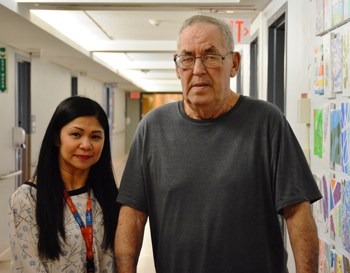FROM EVERYDAY ISSUES TO COMPLEX NEEDS, SOCIAL WORKERS ARE ON THE FRONT LINES OF CARE

By Emily Dawson

Pat Hennessey quickly recognized that her social worker at St. Joseph’s Health Centre, Kate Lawton, would be giving her an unexpected gift – time and a listening ear.
Pat started seeing Lawton during the most difficult time in her life. She was caring for her father with dementia and living with excruciating neck pain due to myofascial pain syndrome. She was also dealing with unresolved grief for her son who she lost prematurely, a grandmother she nursed until her passing, and myriad other losses in her life.
“In my first visit with Kate, not once did she interrupt me,” said Hennessey. “I was able to just let everything out. I left her office feeling like a huge weight was lifted.”
As part of her healing, Lawton asked Hennessey to write a letter to the son she lost.
“We then systematically worked through all the things that had piled up, emotionally,” recalled Hennessey.
“She is so accommodating and flexible. She’s been my saviour. The last time I saw Kate, I asked her to stand up so I could give her a big hug. I told her, ‘You are my guardian angel.’”
Across Unity Health Toronto, social workers such as Lawton provide support, connections, advocacy, and counselling to patients and residents. This March, we’re celebrating Social Work Week and honouring the impact that social workers have on people’s care and experience in our organization.
Lawton is part of St. Joseph’s Urban Family Health Team. Much of her work is with people who are in emotional distress, which severely impairs their ability to function in everyday life. This distress might result from medical or psychological reasons – or a combination of both.
“The trust they give me is an enormous responsibility,” said Lawton. “When I see their progress or help them identify their strengths, and when I can help them identify the hope that things can get better, that’s where the real meaning is in my work.”
***

On a typically busy day at the Inpatient Mental Health Unit at St. Michael’s Hospital, Ron is eager to talk about how social workers, such as Nicole Schroeder, have been supporting him.
“Nicole is great. She’s helped me a lot with my finances and community resources, she knows her stuff,” said Ron.
“There have also been psychological discussions, especially helping me with boundaries and meditation.”
Schroeder is no stranger to the complex issues her patients face, and she’s grateful to work in a system where innovative and strong partnerships – both inside St. Michael’s and within the community – support and advocate for patients like Ron.
“Social workers are experts in system navigation, which can be complex and intimidating structures at the best of times, never mind when people are in crisis or the worst thing in the world has just happened to them,” said Schroeder.
“It’s really about knowing the ins and outs of how people can make a really complicated social situation better. We make connections with the right supports in the system to empower patients with the resources they need.”
Ron is now getting ready to transition back to the community.
“I’m really aware now that I have people in my life to help me, not just people who take advantage of me.”
***

When Richard Payne went to Providence Healthcare for rehabilitation after a stroke, he didn’t expect his social worker, Dione Romero, would have such a profound effect on his recovery.
“I lost my wife and was feeling depressed and desperate before my stroke,” said Payne.
“Dione was the first person I told about my darkest days. All of a sudden, I started talking about really personal stuff and she listened.”
Romero finds joy in the simple act of being present with patients and families, and having the privilege to listen to their story.
“Providing supportive counselling is instrumental to a patient’s emotional recovery. We understand things from their perspective and it allows us to empathize and be better advocates,” said Romero.
“We encourage people to use their voice and sometimes, that also means using our voices so that theirs can be heard.”
Payne, now back at home, attributes his improving health in large part to Romero.
“I don’t know how I could ever tell her how much she helped me. I got my voice back with her. I’m so grateful.”
